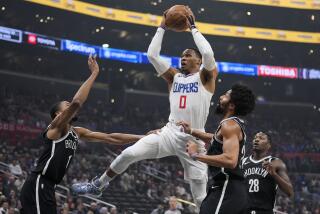Powers that be helped NBA double its Money
NBA veteran Eric Money was strangely, unwittingly caught in the middle when the Philadelphia 76ers finally wrapped up an early-season victory over the New Jersey Nets late in the 1978-79 season.
His team won.
And it lost.
In a game that produced perhaps the most unusual box score in NBA history, Money scored 23 points for the Nets and four for the 76ers. He opened the game at Philadelphia as a starter for the Nets and, 4 1/2 months and a four-player trade later, ended it as a reserve with Julius “Dr. J” Erving and the 76ers.
“I think Doc said something to me like, ‘At least this time you’re on the winning side,’ ” says Money, a 53-year-old educator and grandfather living in San Pedro. “In other words, I made a good move.”
Not that he had a choice.
Money, perhaps the only player ever credited with scoring for both sides in a major U.S. sporting event, was simply swept up in an extraordinary set of circumstances over which he had virtually no control.
“It was all coincidental,” he says.
It all started Nov. 8, 1978, when the 76ers outscored the Nets, 137-133, in double overtime. Midway through the third quarter at the Spectrum, Nets forward Bernard King protested a call and was whistled for a technical foul. It was King’s second technical, prompting his ejection from the game. Richie Powers, the league’s senior official, then hit King with a third technical when King kicked a chair on his way to the locker room.
Powers then assessed two technical fouls on Nets coach Kevin Loughery, his second and third of the game, when the coach rose to King’s defense.
Later, after assistant coach Phil Jackson replaced Loughery and coached the Nets for the game’s final 27 minutes, the Nets filed a protest. Their argument: According to NBA rules, referees may call only two technical fouls against players or coaches for misbehavior, the second resulting in their ejection.
Much like David Stern, who has ordered a do-over Saturday of the final 51.9 seconds of a Miami Heat-Atlanta Hawks game from December because of an error by the Hawks’ scoring crew, then-NBA commissioner Larry O’Brien upheld the Nets’ protest. O’Brien suspended referee Powers for five games without pay “for failure to comply with league procedure” and ordered that the game be resumed with 5 minutes 50 seconds to play in the third quarter and the 76ers leading, 84-81.
Then, about six weeks before the game resumed on March 23, 1979, the teams made a trade, the Nets shipping Money and Al Skinner to the 76ers in exchange for Harvey Catchings and Ralph Simpson.
Catchings and Simpson, like Money, are shown playing for both teams in the final box. But Catchings scored only for the Nets, Simpson only for the 76ers. The box also shows that Jackson, activated during the 135 days between game’s start and end, played 14 minutes for the Nets, scoring four points in their 123-117 loss.
“I’ve been in a lot of strange games,” Loughery told the New York Daily News years later, “but that was obviously the most bizarre.”
Money, now a junior high physical education teacher and assistant high school basketball coach at View Park Prep in the Crenshaw District, says his unprecedented role in the basketball oddity has become a calling card of sorts.
“It’s probably kept my name out there,” he says. “It was years later before people started asking me about it and I had to be reminded about it more than I remembered it, but it’s the one game that has kind of made my career.”
A 6-foot guard from Detroit, Money left Arizona after his sophomore season and was the 33rd pick in the 1974 NBA draft. In six seasons with the Nets, 76ers and Detroit Pistons, he averaged 12 points and nearly four assists.
In one of his first games with the Nets, the disputed double-overtime loss to the 76ers in November 1978, he scored 37 points, though 14 would later be wiped off the books when the NBA granted the Nets’ protest.
“It wasn’t like I didn’t score them,” Money says, denying disappointment over the ruling. “I scored them. They just didn’t allow them.”
Money, his playing time cut after his trade to the 76ers, was on the court for only eight of the suspended game’s last 18 minutes, making two of four shots. Six games into the 1979-80 season, he was traded again -- back to the Pistons.
In 1980, he retired.
By then, of course, his obscure legacy had been set.
His only regret is that he didn’t have the presence of mind to save anything from the game that would make him semi-famous -- not even the final box score.
“When you’re older, I guess you appreciate things more,” he says. “There’s more of a sentimental value to things than there was when they were happening.”
--
--
Begin text of infobox
Money matters
Eric Money played in one game for two teams. The combined box score for the game, originally played on Nov. 8, 1978 and replayed from the 5:50 mark in the third quarter on March 23, 1979:
NETS (117)
*--* Min FG-A FT-A OR-T A P T King...26 3-11 2-2 2 1 5 8 Washington...23 5-7 2-2 8 1 6 12 Johnson...30 3-4 2-2 10 1 5 8 Money...27 11-16 1-2 3 5 0 23 Williamson...43 14-21 6-6 3 3 3 34 Elliott...4 0-1 0-0 2 1 2 0 Boynes...5 1-3 0-0 1 0 0 2 Bredaklff...29 5-8 2-4 6 3 4 12 Jordan...19 1-4 4-6 2 6 1 6 Bassett...4 0-0 0-0 1 0 1 0 Catchings...14 2-4 4-4 4 0 2 8 Simpson...2 0-0 0-0 0 2 0 0 Jackson...14 2-7 0-0 3 0 1 4 *--*
*--* 240 47-86 23-28 45 23 30 117 *--*
PHILADELPHIA (123)
*--* Min FG-A FT-A OR-T A P T Erving...39 11-25 10-13 7 8 2 32 Jones...29 8-11 3-4 9 3 4 19 C. Jones...26 4-7 1-1 7 0 1 9 Cheeks...23 1-6 0-0 4 6 4 2 Collins...23 3-10 4-4 0 5 3 10 Bibby...29 3-6 5-6 5 8 3 11 Dawkins...20 6-9 1-2 5 0 3 13 Mix...16 3-9 3-4 5 2 2 9 Simpson...13 4-6 0-0 1 2 1 8 Bryant...12 3-7 0-0 2 0 1 6 Catchings...2 0-1 0-0 0 0 0 0 Money...8 2-4 0-0 0 1 0 4 *--*
*--* 240 48-101 27-34 45 35 24 123 *--*
*--* Nets 38 32 29 18 -- 117 Philadelphia 21 41 34 27 -- 123 *--*
Referees--Richie Powers, Ed Middleton, Roger McCann, Earl Strom, Bill Star, Jack Madden. Attendance--11,368.
More to Read
Go beyond the scoreboard
Get the latest on L.A.'s teams in the daily Sports Report newsletter.
You may occasionally receive promotional content from the Los Angeles Times.










